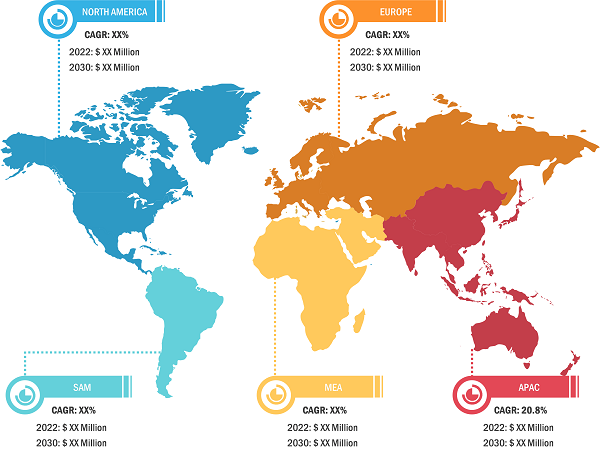Implementation of Smart, Connected, and Energy-Efficient IoT-Enabled HVAC Systems Boosts HVAC Controls Market Growth
According to our latest study on “HVAC Controls Market Forecast to 2030 – COVID-19 Impact and Global Analysis – by Component, Installation Type, System, and End Users,” the HVAC controls market size is expected to reach US$ 41.32 billion by 2030 from US$ 9.73 billion in 2022, at an estimated CAGR of 19.8% from 2022 to 2030.
Lighting and HVAC systems use the most energy in commercial or residential buildings. Air conditioners and electric fans contribute to ~20% of the total electricity consumption in a building. As per a report by International Energy Agency (IEA), the energy demand from air conditioners is expected to grow three times by 2050. According to the US Department of Energy (DOE), commercial buildings use energy worth US$ 190 billion annually. The growing energy consumption from HVAC systems raises electricity costs. Therefore, HVAC manufacturers are seeking ways to enhance the energy efficiency of their products and offer tools to customers that can help them monitor their devices/systems. Implementation of IoT into HVAC systems enables remote appliance control and significantly better customer-centric services. Main advantage of integrating IoT in the energy sector is the operational insight into HVAC appliances and techniques to reduce energy usage significantly. HVAC contractors can get their devices to monitor occupancy inside the building by combining smart devices with motion sensors. The system might recommend that the customer dial down the heating (or cooling) to save energy through an app message when there is no movement for an extended time inside the building. Moreover, the controls use the most recent networking and AI technologies, enabling them to gradually learn the preferences of the tenants and adapt to their comfort requirements. HVAC manufacturers aim to grow their market share by offering consumers intelligent HVAC solutions. Implementation of machine-to-machine (M2M) connectivity with IoT in various applications supports cost savings, resource conservation, predictive maintenance, comfort control, and healthy building performance. As a result, there is a higher need for IoT-based HVAC control systems. Thus, implementation of smart, connected, and energy-efficient IoT-enabled HVAC systems bolsters the HVAC controls market growth.
HVAC Controls Market – by Region, 2022 and 2030
HVAC Controls Market Size and Forecasts (2020 - 2030), Global and Regional Share, Trends, and Growth Opportunity Analysis Report Coverage: By Component (Hardware and Software & Services), Installation Type (New Installation and Retrofit), System (Temperature Control System, Humidity Control System, Ventilation Control System, and Integrated Control System), and End User (Residential, Commercial, and Industrial)
HVAC Controls Market Forecast and Size by 2030
Download Free Sample
Source: The Insight Partners Analysis
The HVAC controls market is segmented on the basis of component, installation type, system, end user, and geography. Based on components, the HVAC controls market is bifurcated into hardware and software & services. By installation type, the market is bifurcated into new installation and retrofit. In terms of systems, the HVAC controls market is segmented into temperature control systems, humidity control systems, ventilation control systems, and integrated control systems. Based on end user, the market is segmented into residential, commercial, and industrial. Geographically, the HVAC controls market is segmented into North America, Europe, Asia Pacific, the Middle East & Africa, and South America.
One of the primary causes fostering the market is the increase in the building of commercial, industrial, and residential structures worldwide. HVAC control systems are frequently used due to the rising demand for improved air quality, performance, and environmental concerns. The HVAC controls market is also expected to grow significantly due to the rising demand for remote access control systems owing to their cost-effectiveness, energy efficiency, and operational efficiency. Further, several technological developments, such as the Internet of Things (IoT) and the incorporation of smart devices with motion sensors, are boosting HVAC controls market growth. These devices help detect occupancy inside the structure and reduce energy use by turning down the heating or cooling system when there is no movement. In addition, developing green technology due to the rising environmental concerns, implementation of several government programs to encourage energy-efficient construction, and growing spending power are a few of the key factors fuelling HVAC controls market growth.
Carrier, Daikin, Delta Controls, Distech Control Inc., Emerson Electric Co., Honeywell International Inc, Johnson Controls, Lennox International Inc, Siemens, and Schneider Electric are among the key players operating in the HVAC controls market.
Contact Us
Phone: +1-646-491-9876
Email Id: sales@theinsightpartners.com